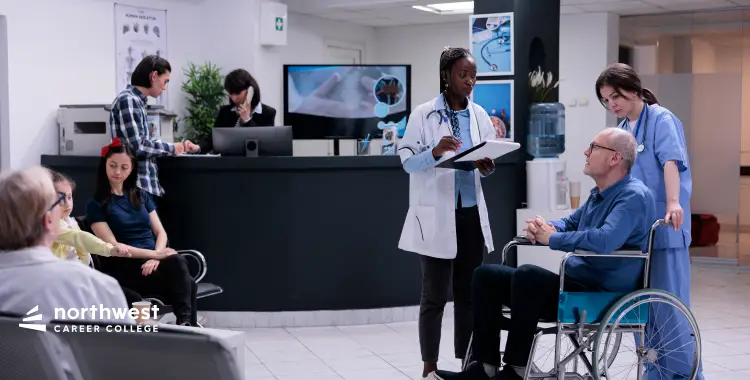Healthcare Administration vs. Clinical Role: What is the Difference?
- November 27, 2025
- 3.1k views
- 4 min read
Are you thinking about pursuing a career in healthcare but not quite sure where to start? Students struggle with choosing between working directly with patients and working in the background. Clinical jobs, such as nursing mean working directly with people.
But what if you’re more of a people manager and want to manage clinics, schedules, and paperwork? That’s where healthcare administration comes in. Both are worthwhile, but they’re very different. Students at Northwest Career College can learn more about these jobs and decide on the career best for them. Ready to discover what’s best for you? Let’s take a breakdown.

Table of Contents
What is Healthcare Administration?
Health administration deals with behind-the-scene tasks that involve how healthcare facilities organize for functionality. People in these positions are concerned with scheduling, billing, and record management.
Whether you are calling to check into an appointment or to ask a question about your insurance, you have spoken with someone in healthcare administration. They ensure patients receive the needed services while enabling the medical staff to do so.
Typical Healthcare Administration Roles
A few examples of these jobs in health administration are listed below:
- Healthcare administrative assistants set appointments and do the paperwork.
- They file and process insurance claims to ensure that providers receive payment.
- They are responsible for the daily operation of a medical office or a clinic.
- Healthcare administrators manage patient records, including completeness, accuracy, and security.
Healthcare administration is a good fit for people who enjoy organizing, communicating, and seeing that everything works right and on time.
What is a Clinical Role?
Clinical roles involve directing contact with the patient for care or treatment. Most clinical workers must undergo specialized training and manual skills. Patients who see clinical workers for checkups, treatment, or tests are clinical workers.
Clinical roles exist in most settings, including hospitals, doctor’s offices, dental clinics, and laboratories.
Clinical Common Roles
Following are a few examples of clinical jobs:
- Doctors: They diagnose and treat diseases and perform surgical operations.
- Nurses: They tend to the patients, monitor their health, and aid treatments in managing patients.
- Phlebotomy Technician: This is the person who draws blood either for testing or for blood donations.
- Dental Assistants are professional groups that assist dentists in the procedural and treatment processes, catering to patients’ needs.
Clinical roles will be significant for those who enjoy hands-on work and want to interact directly with patients.
Key Differences
While both areas are significant in the healthcare setting, considerable differences exist.
Direct Interaction with the Patient
Healthcare Administration: Most of the work is done behind the scenes. You will hardly ever see any patients; most of your job involves a lot of paperwork, scheduling, and other administration.
Clinical roles include direct contact with patients, such as examining the patient, drawing blood, or assisting with treatments.
Type of Work
- Healthcare Administration: Office work; organizing files, answering phones, scheduling.
- Clinical roles involve much more practical work: medical devices, test conduct, and the offering of specific treatments.
Required Skills
- Healthcare Administration: Strong organizational and communication skills and computer-related skills are required. Detail-oriented skills are a plus.
- Clinical Responsibilities: These jobs require technical skills, medical knowledge, and skill in dealing with patients.
Training Needs
- Healthcare Administration: Most careers, which include medical administrative assistants, are learned in short courses toward a certificate.
- Most clinical roles take extra time to learn with the added needs of a degree or other licensure and may be combined with specific clinical hours or internships.
Healthcare Administration Program
The Healthcare Administration Program will provide you with the skills to conduct a wide range of office administrative, patient-care-related, and medical staff-supportive duties. You will learn about scheduling and billing skills and communications in an intensive yet supportive atmosphere.
Clinical career options include various training in dental assistants and phlebotomy technicians. Classes provide immediate, hands-on training to prepare students for their new careers. Our flexible schedules make balancing school with your many other responsibilities easier. In just a few months, you can be on the path to a new and rewarding career in healthcare. Enroll now at Northwest Career College and start a rewarding healthcare career!





